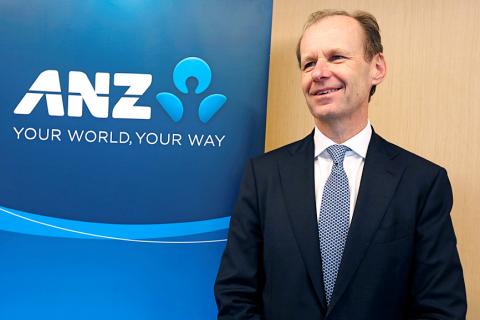The Financial Supervisory Commission (FSC) yesterday fined Australia & New Zealand Banking Group Ltd (ANZ) NT$4 million (US$125,976) for violating rules on sales of yuan-linked target redemption forwards (TRF) to unfit customers.
The commission found that ANZ facilitated TRF sales to unfit customers by helping them meet the criteria for professional investors, which is required for purchasing complex derivative products.
Following volatile movements in the value of the yuan, investors have been left with massive losses from the yuan-linked derivative.

Photo: Reuters
ANZ’s efforts in disclosing assessment risk profiles for clients were inadequate, the commission said, adding that the bank also helped its customers establish offshore accounts and subsidiaries to facilitate TRF sales.
As of 2014, the commission had imposed about NT$76 million in fines on 17 banks. HSBC Bank (Taiwan) Ltd (匯豐台灣商銀) is the only foreign bank that has not been penalized for TRF-related infractions, the commission said.
Separately, the commission also gave the nod to Hotai Motor Co’s (和泰汽車) plan to acquire a 99.73 percent stake in Zurich Insurance (Taiwan) Ltd (蘇黎世產險) for less than NT$6.9 billion.
The commission has set a number of conditions on the deal, which is expected to be completed on Jan. 17.
Hotai, the nation’s leading car dealer, would be required to ensure the long-term sustainable operation of the insurer for at least a decade and its future insurance unit must meet the 300 percent risk-based capital ratio requirement, Insurance Bureau Deputy Directory-General Shih Chiung-hwa (施瓊華) said.
Hotai, which operates Toyota and Lexus dealerships in the nation, first announced its intent to acquire the insurer in June, when it said it hoped to build a 15 percent share of the local car insurance market.
The company has a 32.8 percent hold on the nation’s new car sales, translating to about 12 percent of the local market for auto insurance, Shih said.

SEEKING CLARITY: Washington should not adopt measures that create uncertainties for ‘existing semiconductor investments,’ TSMC said referring to its US$165 billion in the US Taiwan Semiconductor Manufacturing Co (TSMC, 台積電) told the US that any future tariffs on Taiwanese semiconductors could reduce demand for chips and derail its pledge to increase its investment in Arizona. “New import restrictions could jeopardize current US leadership in the competitive technology industry and create uncertainties for many committed semiconductor capital projects in the US, including TSMC Arizona’s significant investment plan in Phoenix,” the chipmaker wrote in a letter to the US Department of Commerce. TSMC issued the warning in response to a solicitation for comments by the department on a possible tariff on semiconductor imports by US President Donald Trump’s

‘FAILED EXPORT CONTROLS’: Jensen Huang said that Washington should maximize the speed of AI diffusion, because not doing so would give competitors an advantage Nvidia Corp cofounder and chief executive officer Jensen Huang (黃仁勳) yesterday criticized the US government’s restrictions on exports of artificial intelligence (AI) chips to China, saying that the policy was a failure and would only spur China to accelerate AI development. The export controls gave China the spirit, motivation and government support to accelerate AI development, Huang told reporters at the Computex trade show in Taipei. The competition in China is already intense, given its strong software capabilities, extensive technology ecosystems and work efficiency, he said. “All in all, the export controls were a failure. The facts would suggest it,” he said. “The US

The government has launched a three-pronged strategy to attract local and international talent, aiming to position Taiwan as a new global hub following Nvidia Corp’s announcement that it has chosen Taipei as the site of its Taiwan headquarters. Nvidia cofounder and CEO Jensen Huang (黃仁勳) on Monday last week announced during his keynote speech at the Computex trade show in Taipei that the Nvidia Constellation, the company’s planned Taiwan headquarters, would be located in the Beitou-Shilin Technology Park (北投士林科技園區) in Taipei. Huang’s decision to establish a base in Taiwan is “primarily due to Taiwan’s talent pool and its strength in the semiconductor

French President Emmanuel Macron has expressed gratitude to Hon Hai Precision Industry Co (鴻海精密) for its plan to invest approximately 250 million euros (US$278 million) in a joint venture in France focused on the semiconductor and space industries. On his official X account on Tuesday, Macron thanked Hon Hai, also known globally as Foxconn Technology Group (富士康科技集團), for its investment projects announced at Choose France, a flagship economic summit held on Monday to attract foreign investment. In the post, Macron included a GIF displaying the national flag of the Republic of China (Taiwan), as he did for other foreign investors, including China-based